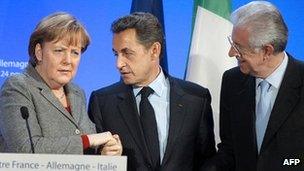Will the euro survive?
- Published
- comments

Time is running out for the eurozone to make big decisions about its future
My eye was drawn this weekend to a reported comment by Jacques Attali, the former President of the European Bank for Reconstruction and Development. The real question, he said, was "will the euro still exist by Christmas?"
Until now most of the speculation about a eurozone break-up has come from Anglo-Saxon scribblers, as the folks in Brussels repeatedly like to point out. While civil servants in London may be game-planning for a split you won't find French officials spending time on scenarios they believe to be impossible.
All of that being said, European officials and ministers have never been so desperate as they are now as we approach the final month of 2011.
The focus this week will be on four bond auctions. France, Italy, Spain and Belgium are needing to raise 17bn euros. But at what cost? That is the question.
The bond markets are effectively on strike when it comes to Europe. Even at very high rates there is a reluctance to invest. Inter-bank lending is drying up and some investors are withdrawing funds particularly from southern European banks.
The key auction is tomorrow in Italy, when it needs to raise 8bn euros (£7bn; $10.6bn). Ordinary Italians are being urged to do their patriotic duty and to buy government bonds. Last Friday the borrowing costs for a 10-year government bond in Italy spiked at 8% before dropping back. It was even paying 6.5% for short-term (six-month) investments. These rates, of course, are not sustainable.
The new Italian Prime Minister, Mario Monti, can only hope that the European Central Bank intervenes robustly and relieves some of the pressure.
But if the highest rates are repeated then Italy and perhaps Spain will need to be rescued. The problem is that there is no mechanism in place to do that.
IMF rescue for Italy?
There is speculation in Italy that Mario Monti might turn to the IMF for help, to bargain for a loan facility in exchange for an IMF-imposed reform programme. It would be a humiliation for Italy, a major Western economy, but it might just come to that, although the IMF itself would probably have to raise extra funds.
So the pressure mounts on Germany to agree to the ECB becoming the lender of last resort. Germany is increasingly isolated in its resistance.
Over the weekend the Austrian Chancellor, Werner Faymann, changed tack and said "the ECB could perform a more powerful role". The Finnish Finance Minister, Jutta Urpilainen, said "if there is nothing else left then we can think about strengthening the role of the ECB". These are the comments of ministers who believe all other options have been tried.
The problem for Angela Merkel is that she has made her stand; her political colours are pinned to the mast of saying "no" to the ECB acting as lender of last resort.
This is where the French see an opening, to bring in the ECB down the road. They believe that if the eurozone signs up to debt limits, to budget discipline through automatic sanctions, to budgetary convergence etc then that could pave the way for the ECB "to play its full role", as the French finance minister said at the weekend.
These plans would require treaty change. Angela Merkel is making that a priority, although it is hard to see how they would take effect until the end of 2012.
Time pressure
So, in a very European way, discussions have started on how to circumvent treaty change, perhaps by an inter-governmental pact between some or all eurozone countries. It would be left to the European institutions to implement the new rules.
The attraction of the inter-governmental route is speed, but it would increase the risk of a two- or even three-speed Europe. For a core within the eurozone might be tempted to go ahead, even if not all the 17 eurozone countries were on board.
In a moment of candour the EU Economics Commissioner, Olli Rehn, said "there is no magic bullet". The facts remain. There is little or no growth in the EU and the economies are slowing. The debt mountains of troubled states are still growing. Unemployment is increasing.
The economies of the eurozone are vastly different. Bringing them closer will not just take time but will need, in some cases, a change of culture. Enforcing budget discipline from the centre will be very difficult - particularly if it leads to a dismantling of social programmes.
Having said all that, German and French officials are working round the clock to come up with a solution that might calm the markets. They have to get through this week and then the focus will be on a European summit on 9 December. For the moment this is all about firefighting, getting through to Christmas and the New Year without a major event.